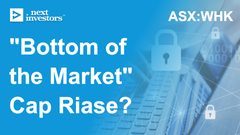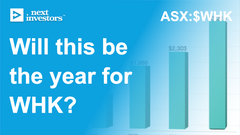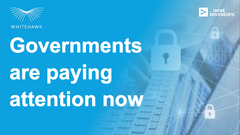We've been hacked!! Why SMEs are key
Hey! Looks like you have stumbled on the section of our website where we have archived articles from our old business model.
In 2019 the original founding team returned to run Next Investors, we changed our business model to only write about stocks we carefully research and are invested in for the long term.
The below articles were written under our previous business model. We have kept these articles online here for your reference.
Our new mission is to build a high performing ASX micro cap investment portfolio and share our research, analysis and investment strategy with our readers.
Click Here to View Latest Articles
Knowledge is power.
Data = knowledge.
Whoever holds the data, holds the power.
It’s this fact that ensures cybersecurity remains at the forefront of risk management, as ill-prepared companies continue to fall victim.
Don’t believe me? Here’s a summation of some of the largest data breaches in the past decade.
- Yahoo.com: The media giant was hacked in September 2016. 500 million records affected
- Friend Finder Network: Usernames, email addresses and passwords stolen. 412 million records affected
- Marriott Hotels: In November 2018 customer data (including credit card and passport info) was stolen. 383 million records affected.
- China: The resumes of Chinese nationals were leaked. Info included names, mobile phone numbers, emails, marriage status and political alignment among details released. 202 million records affected
- LinkedIn: In May 2016, 117 million passwords were stolen from the popular social media networking platform
Hackers are now turning their attention to bigger rewards as they seek out prized government targets. These attacks are becoming more prevalent and growing in sophistication, as leading countries lag behind.
In December 2018, Chinese intelligence services pulled off an extraordinary attack on the world’s leading software groups including Hewlett Packard, SAP and IBM.
The successful assault exposed extensive records from third party clients of the above, which included thousands of Australian companies and government agencies. The fallout from the attack is still unknown to this day.
Alastair MacGibbion, who is the head of the government’s Australian Cyber Security Centre, spoke on the attack in December.
“It’s the biggest and most audacious campaign I’ve seen,” he said. “This is massive in its scope and scale. It’s breathtaking.”
Just two months later, Australia was hit again.
On February 9, the Parliamentary Network (which is used by every MP in the nation) was compromised.
Thankfully, the fallout from the breach appears minimal at this point in time, “There is no evidence that any data has been accessed or taken at this time, however this will remain subject to ongoing investigation,” a government statement read.
But if the Government cannot keep its data safe, then what hope in hell does anyone else have?
The answer may surprise you.
A huge wake up call – will it be answered?
Opposition Leader Bill Shorten described the February 9 breach as, “A huge wake up call,” for small and medium businesses (SMEs), which are targets in almost half of all cyberattacks.
Small and medium sized businesses have been slow to take up the fight because they assume hackers have little interest in their organisations. Why would they care about us? What data do we have that they care about?
Unfortunately they are gravely mistaken.
Because SMEs present opportune entry points for hackers into larger, data rich networks (such as governments, corporations and banks), their importance in the first line of defence against hackers cannot be understated.
In fact, there’s a good chance a third party government contractor was leveraged to gain access to the Parliamentary Network earlier this month.
Furthermore, the financial ramifications should be encouragement enough for SMEs to change their cybersecurity habits. According to the United States National Security Alliance, 60% of small businesses in America that are hit by a cyberattack spend US$690k or more shoring up their network after the fact.
Ouch.
Thankfully, as awareness around cybersecurity improves, so do the solutions.
Emerging companies like WhiteHawk (ASX:WHK) have identified the important role SMEs have to play in combating cyberwarfare. As a result, it has created the world’s first dedicated online cybersecurity exchange, which provides companies with the ideal platform to safeguard their digital future.
The SaaS solutions provider also works with SMEs step by step to evaluate their digital footprint and cybersecurity risk.
If SMEs can work towards solidifying their cyberattack readiness, we'll be one step closer to a more secure digital world.
General Information Only
S3 Consortium Pty Ltd (S3, ‘we’, ‘us’, ‘our’) (CAR No. 433913) is a corporate authorised representative of LeMessurier Securities Pty Ltd (AFSL No. 296877). The information contained in this article is general information and is for informational purposes only. Any advice is general advice only. Any advice contained in this article does not constitute personal advice and S3 has not taken into consideration your personal objectives, financial situation or needs. Please seek your own independent professional advice before making any financial investment decision. Those persons acting upon information contained in this article do so entirely at their own risk.
Conflicts of Interest Notice
S3 and its associated entities may hold investments in companies featured in its articles, including through being paid in the securities of the companies we provide commentary on. We disclose the securities held in relation to a particular company that we provide commentary on. Refer to our Disclosure Policy for information on our self-imposed trading blackouts, hold conditions and de-risking (sell conditions) which seek to mitigate against any potential conflicts of interest.
Publication Notice and Disclaimer
The information contained in this article is current as at the publication date. At the time of publishing, the information contained in this article is based on sources which are available in the public domain that we consider to be reliable, and our own analysis of those sources. The views of the author may not reflect the views of the AFSL holder. Any decision by you to purchase securities in the companies featured in this article should be done so after you have sought your own independent professional advice regarding this information and made your own inquiries as to the validity of any information in this article.
Any forward-looking statements contained in this article are not guarantees or predictions of future performance, and involve known and unknown risks, uncertainties and other factors, many of which are beyond our control, and which may cause actual results or performance of companies featured to differ materially from those expressed in the statements contained in this article. S3 cannot and does not give any assurance that the results or performance expressed or implied by any forward-looking statements contained in this article will actually occur and readers are cautioned not to put undue reliance on forward-looking statements.
This article may include references to our past investing performance. Past performance is not a reliable indicator of our future investing performance.






